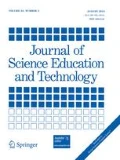REFERENCES
American Association for the Advancement of Science (AAAS) (1993). Benchmarks for Science Literacy, Oxford University Press, New York.
Bardeen, M., and Lederman, L. L. (1998), Coherence in science education. Science 281: 178–179.
Bass, H. (1998). The math education debates. In Presentations to The Center for Science, Mathematics, and Engineering Education, February 1998, Beckman Center, Irvine, CA. Later expanded to the Research symposium—Reflecting on the math wars: Perspectives on the role of research and researchers in the public discourse about mathematics education reform in April 1998, NCTM meeting, Washington, DC.
Brandwein, P. (1955). The Gifted Student as Future Scientist, Harcourt Brace, New York.
Brandwein, P. (1962) Elements in a Strategy for Teaching Science in the Elementary School. The Burton Lecture, Harcourt Brace, New York.
Brandwein, P. (1965) Substance, Structure, and Style in the Teaching of Science, Harcourt Brace, Jovanovich, New York.
Bransford, J., Brown, A., and Cocking, R. (Eds.) (2000) How People Learn: Brain, Mind, Experience, and School, National Academy Press, Washington, DC.
Bransford, J., Donovan, M. S., and Pelligrino, W. (Eds.) (1999) How People Learn: Bridging Research and Practice, National Academy Press, Washington, DC.
Brandwein, P., Metzner, J., Morholt, E., Roe A., and Rosen, W. (1962) Teaching High School Biology: A Guide to Working With Potential Biologists. Biological Sciences Curriculum Study Bulletin No. 2, American Institute of Biological Sciences, Jovanovich, Washington, DC.
BSCS (1959, Sept.). Personnel. BSCS Newsletter 1: 5.
BSCS (1960, May). BSCS committee plans program of original investigations for science-prone students. BSCS Newsletter 3: 3.
BSCS (1961, April). Biological investigations for secondary school students. BSCS Newsletter 7: 4.
BSCS (1963) Biology Teachers' Handbook. Wiley, New York.
Bybee, R. (1997) Achieving Scientific Literacy, Heinemann, Portsmouth, NH.
Conant, J. B. (1957) (Eds). Harvard Case Histories in Experimental Science. Harvard University Press, Cambridge.
DeBoer, G. (1991). A History of Ideas in Science Education, Teachers College Press, New York.
Donovan, M. S., Bransford, J., and Pellegrino, J. (2000) How People Learn: Bridging Research and Practice. National Academy Press, Washington DC.
Glass, B. (1976). Reflections on the early days of BSCS. BSCS Newsletter 64: 1–3.
Kliebard, H. (1994). Curriculum ferment in the 1890s. In Cobb, M. (Ed.), The Future of Education: Perspectives on National Standards in America, College Entrance Examination Board, New York, pp. 17–39.
Muller, Hermann, J. (1957). Man's place in living nature. Scientific Monthly 84:245.
Mullis, I. V., Martin, M., Smith, T., Garden, R., Gregory, K., Gonzalez, E., Chrostowshi, S., and O'Connor, K. (2003) TIMSS Assessment Frameworks and Specifications, International Association for the Evaluation of Educational Achievement (1EA), Boston.
Metzenberg, S. (1998, July 23). Testimony. Hearing before the United States House of Representatives Committee on Science, Subcommittee on Basic Research.
National Research Council (NRC) (1996) National Science Education Standards, National Academy Press, Washington, DC.
National Research Council (NRC) (2000). Inquiry and the National Science Education Standards, National Academy Press, Washington DC.
OECD (2000). Measuring student knowledge and skills: The PISA 2000 assessment of reading, mathematical, and scientific literacy. Paris: Organization for Economic Co-Operation and Development.
Olson, S. (1998, Sept.). Science friction. Education Week 30: 25–29.
Randolph, J. L. (2002). Scientists in the Classroom, Palgrave, New York.
Rutherford, F. J. (1964). The role of inquiry in science teaching. Journal of Research in Science Teaching 2: 80–84.
Rutherford, F. J. (2000). Coherence in high school science. In Making Sense of Integrated Science: A Guide for High Schools, BSCS, Colorado Springs, CO, pp. 21–29.
Schmidt, W. H., and Knight, C. C. (1998). What can we really learn from TIMSS? Science 282: 1830–1831.
Schmidt, W. H., McKnight, C. C., Houang, R. T., Wang, H. C., Wiley, D. E., Cogan, L. S., and Wolfe, R. G. (2002). Why Schools Matter: A Cross-National Comparison of Curriculum and Learning, Jossey-Bass, San Francisco.
Schwab, J. (1961, September). Some reflections on science education. BSCS Newsletter 9: 8–9.
Schwab, J. (1962). The concept of the structure of a discipline. The Educational Record July: 197–205.
Schwab, J., and Brandwein P. (1966) The Teaching of Science, Harvard University Press, Cambridge, MA. Includes The Inglis Lecture, The Teaching of Science As Enquiry by Joseph J. Schwab, and The Burton Lecture, Elements in a Strategy for Teaching Science in the Elementary School, by Paul Brandwein.
Stillman, C. (1997). Science in an ecology of achievement. In The First Paul F-Brandwein Symposium, Dingmans Ferry, PA, November 13–17.
Welch, W., Klopfer, T., Aikenhead, G., and Robinson, J. (1981). The role of inquiry in science education: Analysis and recommendations. Science Education 65: 33–50.
Author information
Authors and Affiliations
Rights and permissions
About this article
Cite this article
Bybee, R.W. The Teaching of Science: Content, Coherence, and Congruence. Journal of Science Education and Technology 12, 343–358 (2003). https://doi.org/10.1023/B:JOST.0000006280.59248.41
Issue Date:
DOI: https://doi.org/10.1023/B:JOST.0000006280.59248.41

